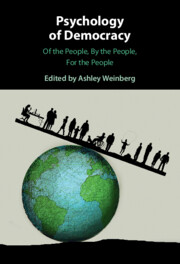Book contents
- Psychology of Democracy
- Psychology of Democracy
- Copyright page
- Contents
- Figures
- Tables
- Contributors
- Preface
- Acknowledgements
- Chapter 1 Psychology of Democracy
- Part I Of the People
- Part II By the People
- Part III For the People
- Chapter 14 Democracy as a Moral Challenge
- Chapter 15 ‘Can I Trust My Future?’
- Chapter 16 Religious Identity Politics and Genuine Support for Democracy
- Chapter 17 Psychology, Democracy and the Media
- Chapter 18 A Social Psychological Approach to Understanding China’s Democratisation
- Chapter 19 The Psychology of Radicalised Conceptions of Democracy
- Index
- References
Chapter 18 - A Social Psychological Approach to Understanding China’s Democratisation
from Part III - For the People
Published online by Cambridge University Press: 24 February 2022
- Psychology of Democracy
- Psychology of Democracy
- Copyright page
- Contents
- Figures
- Tables
- Contributors
- Preface
- Acknowledgements
- Chapter 1 Psychology of Democracy
- Part I Of the People
- Part II By the People
- Part III For the People
- Chapter 14 Democracy as a Moral Challenge
- Chapter 15 ‘Can I Trust My Future?’
- Chapter 16 Religious Identity Politics and Genuine Support for Democracy
- Chapter 17 Psychology, Democracy and the Media
- Chapter 18 A Social Psychological Approach to Understanding China’s Democratisation
- Chapter 19 The Psychology of Radicalised Conceptions of Democracy
- Index
- References
Summary
As an alternative to structural and elite-centred approaches, this chapter employs a social psychological approach in examining the democratisation of China. Differing from institutional analyses in political studies, it focuses on the role of ordinary people in politics and democratisation. In addition, how ordinary Chinese people view democracy and the current regime is considered as a determining factor in democratisation and aspirations for its development. Based on accumulated empirical findings, this chapter constructs an integrated theoretical framework within which to analyse China’s democratisation. Guided by this framework, the political psychological impact of economic modernisation, the influence of political culture as well as popular perceptions of democracy are investigated in a Chinese context. The analysis indicates a possible trajectory by which democratisation could yet take place in China. Two idealised types of democratisation are also discussed.
Keywords
- Type
- Chapter
- Information
- Psychology of DemocracyOf the People, By the People, For the People, pp. 403 - 422Publisher: Cambridge University PressPrint publication year: 2022
References
- 2
- Cited by

